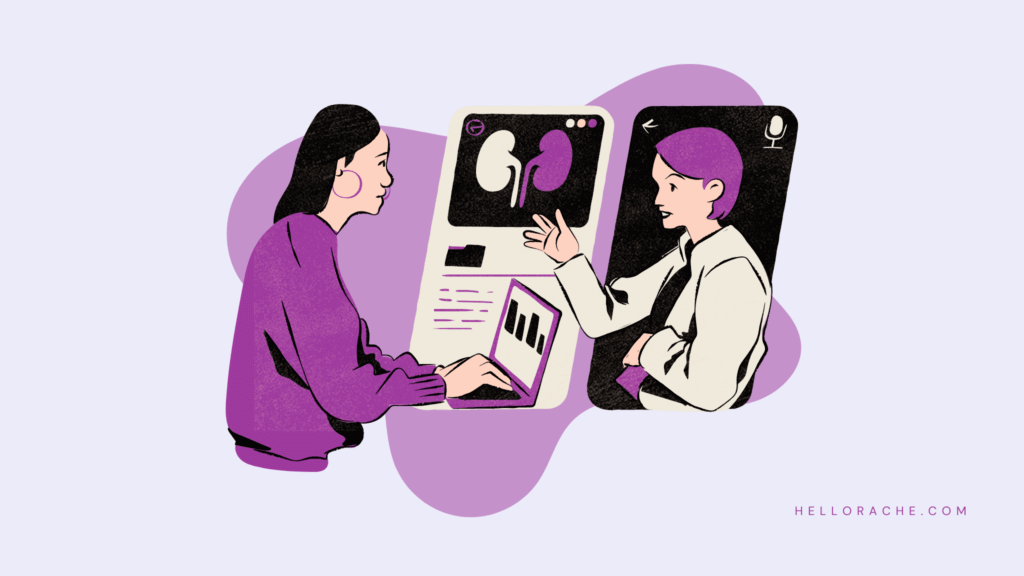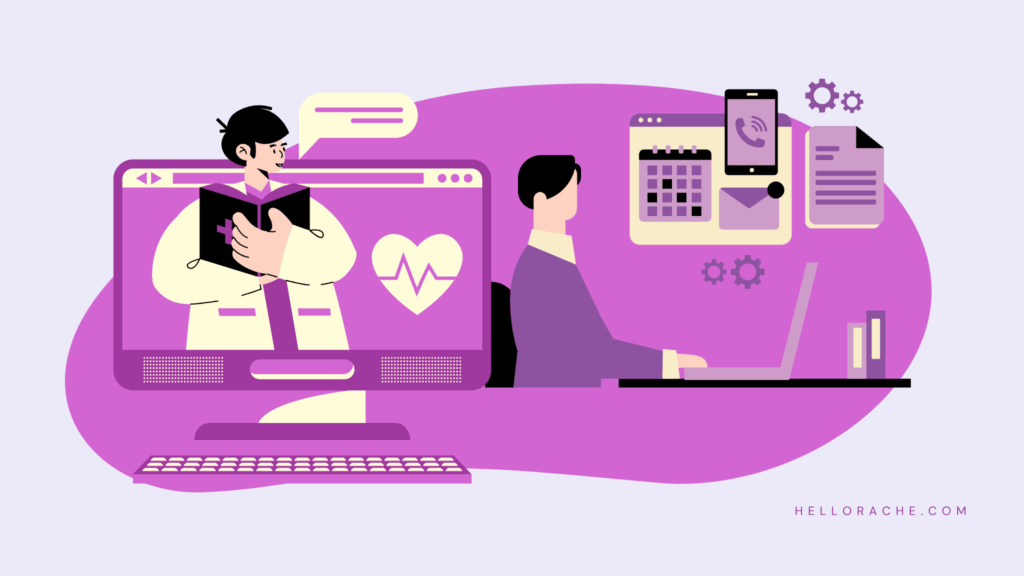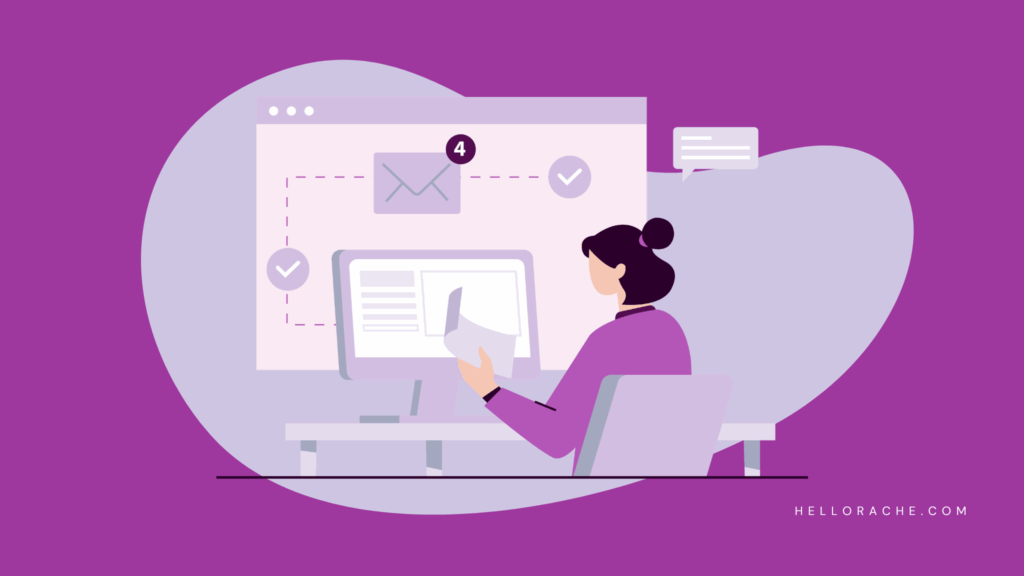In any year, 26% of adults in the US have a mental disorder. These people often require a multidisciplinary team to support them as they learn to live with their diagnosis.
Psychiatrist assistants, also known as psychiatric aides or mental health assistants, play an important role. Right now, there are 145,600 psychiatrist assistants in the US, and this number is set to grow by 11% by 2030.
If your specialty involves treating mental health patients, you may be wondering how a psychiatrist assistant can help.
In this article, we'll tell you about the profession, as well as the basic education requirements and salary.
What is a psychiatrist assistant?
Psychiatrist assistants work in a range of settings. For example, you can find them in psychiatric hospitals, mental health facilities, and private practices.
These trained mental health professionals support the mental health team. They monitor patients and follow treatment plans. Psychiatrist assistants can administer medication. However, they aren't able to prescribe it.
Psychiatrist assistants help patients with basic everyday tasks, including bathing, dressing, and eating.
Depending on the facility, these workers may transport patients to appointments and leisure activities.
As a mental health assistant, the aide follows the psychiatrist's instructions and makes sure patients are comfortable.
Psychiatrist assistants can work full-time or part-time. Some roles include overnight shifts, weekends, and overtime.
Do you need administrative support in your care team? We have a solution. Whether you're a psychiatrist, physician, or another healthcare professional, a virtual assistant could help you streamline your processes.
From answering phones to transcribing documents, our team can be there. Contact us today to learn more.
What skills does a psychiatrist assistant need?
There are specific skills a psychiatrist assistant should have. For example, it can be an intense work environment, so they should be able to work under pressure.
To be successful, they'll need patience, empathy, and compassion.
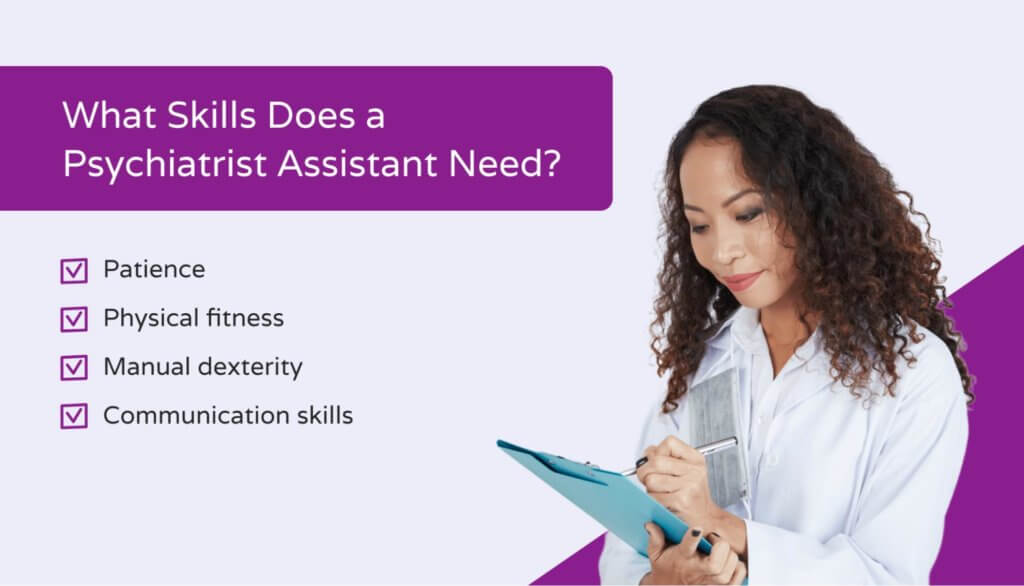
The job can involve manual handling; most shifts will be spent on their feet. This can be physically demanding, so fitness and manual dexterity are required.
Psychiatrist assistants need excellent communication skills. These mental health aides need to be confident and calm to provide care for patients with mental illnesses.
Sometimes, psychiatrist assistants must communicate with a patient's family. They'll also be part of a team with other medical staff.
Because they deal with so many different people, they should have good body language and excellent listening skills. Psychiatrist assistants may need to overcome language barriers.
Computer skills and phone skills are also essential for the job.
What education does a psychiatrist assistant need?
If someone wants to work as a psychiatrist assistant, they'll need a high school diploma or equivalent. Individual employers may have a minimum age requirement.
Some positions are entry-level with on-the-job training. The facility can help these workers obtain an active license in their state. Depending on the state and job requirements, other roles may require a certification.
A first aid certificate and experience in customer service or healthcare can be an advantage. There are educational programs available that teach first aid for mental health, awareness of disorders, legal obligations, and other vital skills.
Psychiatrist assistants may work in this role while studying. For example, they may be working toward a medical degree in psychology, social work, or psychiatry.
Most psychiatrist assistants need a valid driver's license. They'll also need to pass a background check and drug screening.
What does a psychiatrist assistant do?
Psychiatrist assistants work in different healthcare settings. Whether it's a psychiatric unit in a hospital or an adult outpatient clinic, many of their responsibilities will be the same.
Here are some of the top duties you'll find on a psychiatrist assistant job description.
1. Supports the psychiatrist
The psychiatrist assistant supports the psychiatrist and other healthcare professionals.
They may be present during appointments and help the psychiatrist with administrative tasks. For example, they may update patient files, check details, and take notes.
Psychiatrist assistants work closely with patients and follow any programs and recommendations.
People under psychiatric care will have individualized plans based on their condition. Education, recreational activities, personal goals, and medication could be included in the plan. The psychiatrist assistant can support the patient in any of these areas.
If there are any issues or questions, they'll check in with their supervisor.
The psychiatrist assistant will follow all rules and regulations. They'll keep the patient's details confidential and complete any paperwork to a high standard.
2. Observes patients
Patients can access inpatient services and outpatient services. There can be a range of reasons for their visits, including substance abuse and personality disorders.
Mental health workers observe patients. If a person needs help, the psychiatrist assistant will be there to support them. Whether it's short-term or long-term, they'll take note of any changes.
If it's an emergency situation, they may need to check their vital signs. If they notice a decline, they'll page a senior team member for assistance.

In other circumstances, the psychiatrist assistant will monitor patients over time. They'll flag any changes in their condition, mood, and behavior.
Patient observation may need to be around the clock, with psychiatrist assistants taking day or night shifts.
3. Administers medication
Psychiatrists have advanced degrees, and their training and experience mean they can prescribe medications.
While psychiatrist assistants don't have the right qualifications to write prescriptions, they can help administer medication. Extra training will usually be required for medication administration.
The type of medication will depend on the patient's condition. For example, the psychiatrist may prescribe anti-psychotics, antidepressants, or mood stabilizers.
Psychiatrist assistants need to check the medication carefully and give the correct dosage. They'll record the details on the patient's chart.
Often, medications need to be taken at regular intervals, so they'll need to get the timing right for each dose. Attention to detail is essential because mistakes can lead to negative health outcomes.
4. Assists with daily living tasks
Daily life can be difficult when living with a mental illness. Psychiatric assistants help patients with common tasks.
The type of assistance can depend on the person's condition. However, it's not uncommon for these workers to help with bathing, brushing teeth and hair, and dressing their patients.
Patients may have special requests, such as help tying their shoelaces.
Some patients can be distressed or violent. If this happens, the psychiatrist assistant will report the behavior and request support from additional staff.
While providing these mental health services, they may notice signs of injuries such as bed sores or self-harm. If this is the case, they'll notify their supervisor.
5. Supervises recreational activities
Recreational activities can be part of the treatment plan. The psychiatrist assistant will supervise and encourage patients while they're participating in different activities and events.
Some of these activities will be on-site. However, if travel is required, a psychiatrist assistant will go with the patients.

There is a range of activities that may be recommended. The solution will depend on the person's interests and limitations.
For example, art and music can be beneficial. Group fitness classes, swimming, walking, and gardening are also common.
Some patients may enjoy volunteering and helping out in their local community.
6. Serves meals
Mental health services that provide overnight care need to provide meals to patients. These should be nutritional and meet any dietary requirements.
The psychiatrist assistant may bring patients their meals. In some situations, they may have to help them eat or stay and supervise. Patients may have difficulty swallowing or refuse to eat.
These care workers should be aware of any allergies or food aversions.
Depending on the environment, psychiatrist assistants may help patients prepare their own meals. This can make it easier for them to live independently.
7. Changes bedding
Another job duty of a psychiatrist assistant is to change the bedding. This task is done regularly and more often if a patient has an accident.
While they won't usually need to wash and dry the bedding, having to remove and replace bedsheets and blankets is common. Patients may ask for extra bedding and pillows, and this should be accommodated if possible.
Hospital gowns and other uniforms may also be removed from the room, ready for washing.
There may be additional cleaning tasks on the daily to-do list. For example, they may take out garbage, bring in fresh water, and wipe down surfaces.
8. Transports patients
Psychiatrist assistants usually need a valid driver's license and should be safe on the road because they'll be responsible for transporting patients.
If it's an inpatient facility, the patient may need to attend outside appointments. For example, they may need to visit a physician or access mental healthcare.
These team members will be reliable and make sure the patients get to their destinations safely and on time.
Plus, they'll drive patients to their recreational activities.
How much does a psychiatrist assistant make?
Now, you may be wondering how much a psychiatrist assistant makes.
The average annual wage for someone working in this position is $36,230 or $17.42 per hour.
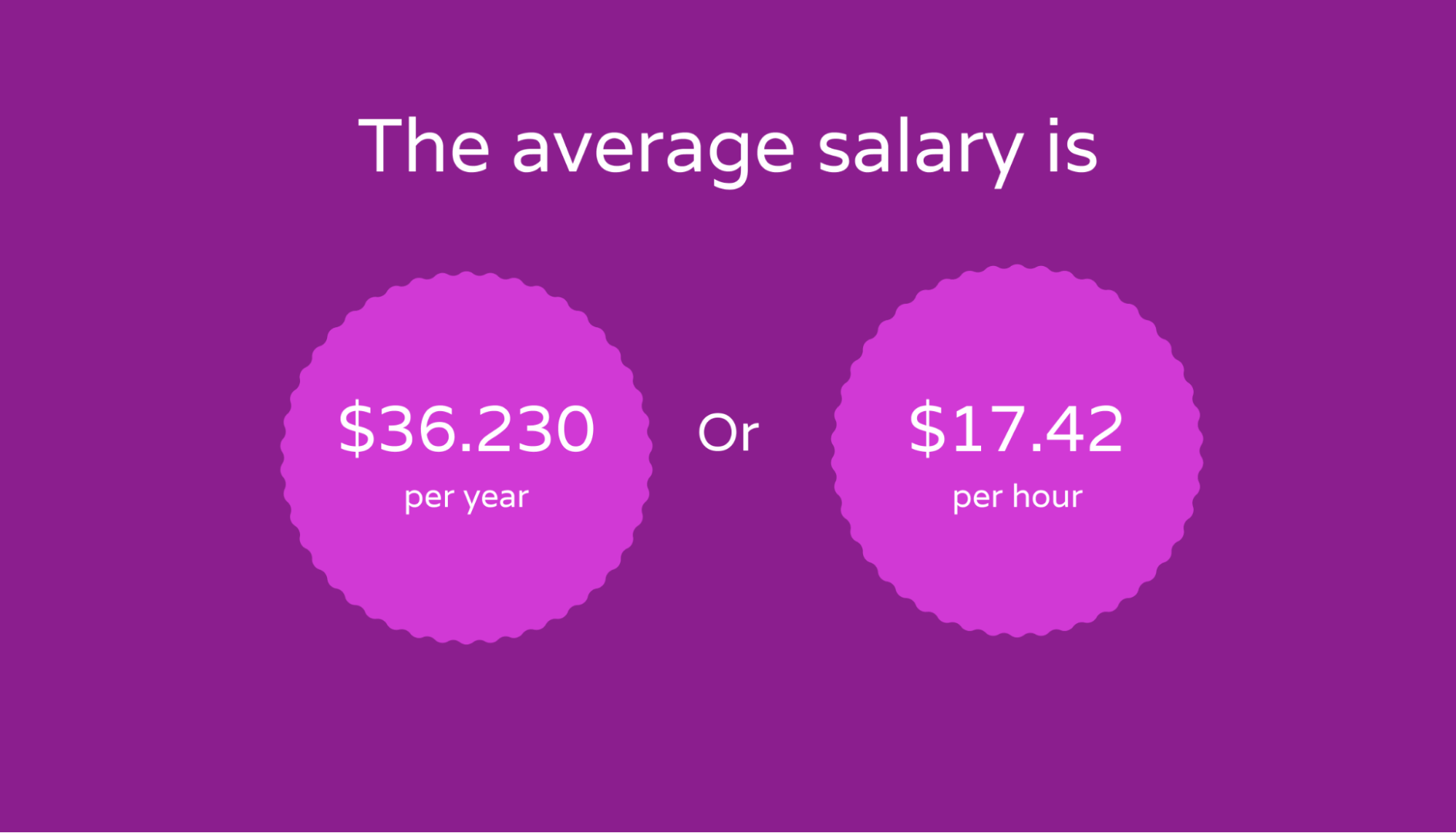
The rate can vary depending on the industry. For example, the average salary for someone working in a psychiatric and substance abuse hospital is $37,050.
Those who work in a residential treatment facility make an average of $28,250 per year.
The average wage can also vary between states. The highest paying state is Connecticut, where the average yearly salary is $47,000. This is followed by California at $46,410 and New York at $45,700.
To get the full rundown, take a look at our psychiatrist assistant salary guide.
If you need help with administrative tasks, using a healthcare virtual assistant (HVA) from Hello Rache could save you money.
Our service costs just $9.50 per hour, and there are no contracts. Take a look at our pricing page for more information.
How can a healthcare virtual assistant support your mental healthcare team?
You know the types of tasks a psychiatrist assistant can do. If you already have a team of in-person clinical staff members, you may not need to hire a new employee.
Instead, you can get help with your administrative tasks. When you choose a virtual healthcare assistant, you can support your existing team. We'll take care of the paperwork, so you can focus on your patients and positive mental health outcomes.
Working in mental healthcare can be fulfilling, but the workload can become overwhelming. With the help of an HVA, your team can have a better work-life balance and take time off to recharge and unwind.
Our HVAs work remotely and can assist in both inpatient and outpatient settings. They can perform a range of duties, including answering phones, updating files, and transcribing documents.
It's an affordable option, and there are no long-term commitments. You won't need to worry about benefits or taxes, and there's no need to free up extra office space.
HVAs are trained and understand complex medical terminology. They’re certified in HIPAA-compliant training and know how to manage confidential and sensitive data.
As long as you have access to the internet, you can take advantage of our virtual services.
Contact us to learn more about our healthcare virtual assistant services.

All about psychiatrist assistants
Those looking for careers in healthcare may work as psychiatric assistants.
These team members support the psychiatrist and follow their treatment plans. They observe patients and administer medication.
In some settings, the psychiatrist assistant will serve meals, change bedding, and assist with daily living tasks.
They transport patients to appointments and recreational activities and supervise them if required.
Psychiatrist assistants need to be patient, calm, and attentive to detail. They should feel comfortable working on a team, be physically fit, and have excellent communication skills.
These workers can assist with administrative duties. However, if you are only looking for clerical help, a healthcare virtual assistant could be a more convenient option.
Before you go, visit our services page to find out more. Plus, we have more articles like this one on our healthcare blog.


